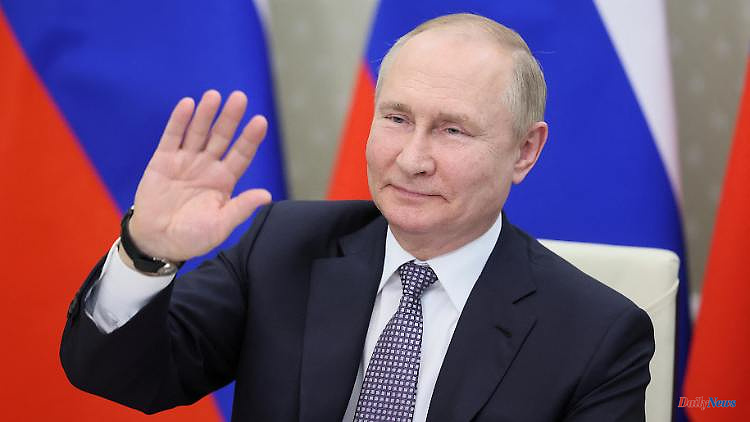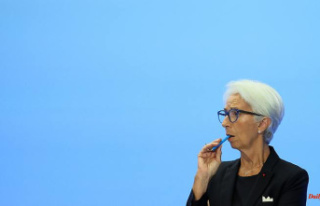Gas is flowing through Nord Stream 1 again - albeit less than before the maintenance. The Kremlin is thus trying to further unsettle Germany. So far this tactic is working.
The mind game continues. After the maintenance work on Nord Stream 1, the Russian energy giant Gazprom turns on the gas tap again - but only a little. According to Federal Network Agency head Klaus Müller, the gas volume announced for Thursday is only 30 percent of the pipeline's capacity.
This means that the uncertainty about gas deliveries from Russia remains with us, because the volume routed through the pipeline can change on a daily basis. And this uncertainty is exactly what the Kremlin wants.
Even before the maintenance, Gazprom had cut gas supplies via Nord Stream 1 to a volume of 40 percent. Official reason: technical problems and the lack of a Siemens Energy turbine that is being repaired. The Federal Government considers these arguments to be false. The turbine is currently on its way to Russia. It is questionable whether the gas supply will actually flow at full capacity again after installation in the compressor station near the Finnish border.
Because the Kremlin has continued to throttle deliveries to Europe in recent months. There is only so much gas flowing that the fear of a delivery stop remains high and the West softens its own sanctions. Splitting the West over sanctions and arms deliveries is one of the Kremlin's goals.
This strategy works particularly well in Germany. It leads the State Department to pressure the Canadian government with a drastic warning to allow the delivery of a Canada-serviced Nord Stream 1 turbine if Russia uses the turbine's failure as an excuse and Germany shuts off the gas altogether , there could be popular uprisings in Germany. That was "perhaps a little exaggerated," said Foreign Minister Annalena Baerbock. But the Kremlin should be happy about this scaremongering.
Meanwhile, Russian gas continues to flow west, including through Ukraine. Since the price has shot up after the start of aggressive war, Russia is making a lot of money even with reduced supply. So far, almost half of the Russian state budget has been financed by income from the sale of oil and gas.
This income is likely to be one of the main reasons why the Kremlin has not yet turned off the tap completely. Russia wants to earn money from the West for as long as possible. Another reason: As soon as the flow of gas runs dry, politicians and industry are forced to find replacements more quickly than before. In addition, the pressure to save a lot of energy would increase.
That is a strategic question, said Janis Kluge from the Science and Politics Foundation in an interview with ntv.de. The Kremlin is concerned with causing the greatest damage. "The earliest point in time is not necessarily the hardest. If Russia had cut off our gas in March, there would long have been a completely different crisis policy with much more massive austerity measures. There would be no doubt that we would have to get through the winter without Russian gas, and we would have had six months to prepare," said Kluge. Now the uncertainty is increasing.
In addition, there are "still people in Germany, including politicians, who hope that things won't get that bad," says Kluge. "That's why we're less politically prepared than we would be if Gazprom had stopped supplying it in March, even though the storage facilities are now full."
The threat to turn off Germany's gas currently seems more effective than actually doing so. Russia is doing serious damage with it - with comparatively little use. In addition, politicians and the population are almost exclusively discussing what damage Germany could face if a Russian gas freeze were to occur. The extent to which Western sanctions are damaging the Russian economy hardly plays a role in people's perceptions. This increases the likelihood that popular support for sanctions against Russia will wane.
"Winter is coming. This allows [the Kremlin] to play the gas card to maximum effect in the coming months," said Leonid Volkov, chief of staff to jailed Russian opposition leader Alexei Navalny. Russian President Vladimir Putin will try to scare Europeans with the prospect of "freezing to death in their homes." Putin learned during his rule that if you can't deal with politicians from the West directly, you have to work with their electorate.
According to the ZDF Politbarometer, 70 percent of all respondents say that they continue to support Ukraine in defending against the Russian attack, despite high energy prices. In a Forsa poll, however, for the first time a narrow majority (51 percent) believed that the sanctions imposed on Russia harmed Germany more than Russia.












